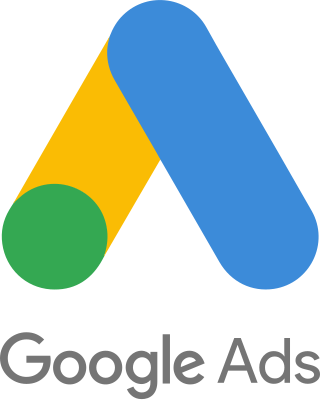Digital display advertising is online graphic advertising through banners, text, images, video, and audio. The main purpose of digital display advertising is to post company ads on third-party websites. A display ad is usually interactive, which allows brands and advertisers to engage deeper with the users. A display ad can also be a companion ad for a non-clickable video ad.
Google AdSense is a program run by Google through which website publishers in the Google Network of content sites serve text, images, video, or interactive media advertisements that are targeted to the site content and audience. These advertisements are administered, sorted, and maintained by Google. They can generate revenue on either a per-click or per-impression basis. Google beta-tested a cost-per-action service, but discontinued it in October 2008 in favor of a DoubleClick offering. In Q1 2014, Google earned US$3.4 billion, or 22% of total revenue, through Google AdSense. AdSense is a participant in the AdChoices program, so AdSense ads typically include the triangle-shaped AdChoices icon. This program also operates on HTTP cookies. In 2021, over 38.3 million websites use AdSense.

Google Ads is an online advertising platform developed by Google, where advertisers bid to display brief advertisements, service offerings, product listings, and videos to web users. It can place ads in the results of search engines like Google Search, mobile apps, videos, and on non-search websites. Services are offered under a pay-per-click (PPC) pricing model.
Click fraud is a type of fraud that occurs on the Internet in pay-per-click (PPC) online advertising. In this type of advertising, the owners of websites that post the ads are paid based on how many site visitors click on the ads. Fraud occurs when a person, automated script, computer program or an auto clicker imitates a legitimate user of a web browser, clicking on such an ad without having an actual interest in the target of the ad's link in order to increase revenue. Click fraud is the subject of some controversy and increasing litigation due to the advertising networks being a key beneficiary of the fraud.
Pay-per-click (PPC) is an internet advertising model used to drive traffic to websites, in which an advertiser pays a publisher when the ad is clicked.
An online advertising network or ad network is a company that connects advertisers to websites that want to host advertisements. The key function of an ad network is an aggregation of ad supply from publishers and matching it with advertiser's demand. The phrase "ad network" by itself is media-neutral in the sense that there can be a "Television Ad Network" or a "Print Ad Network", but is increasingly used to mean "online ad network" as the effect of aggregation of publisher ad space and sale to advertisers is most commonly seen in the online space. The fundamental difference between traditional media ad networks and online ad networks is that online ad networks use a central ad server to deliver advertisements to consumers, which enables targeting, tracking and reporting of impressions in ways not possible with analog media alternatives.
Online advertising, also known as online marketing, Internet advertising, digital advertising or web advertising, is a form of marketing and advertising which uses the Internet to promote products and services to audiences and platform users. Online advertising includes email marketing, search engine marketing (SEM), social media marketing, many types of display advertising, and mobile advertising. Advertisements are increasingly being delivered via automated software systems operating across multiple websites, media services and platforms, known as programmatic advertising.

Ogilvy is a New York City-based British advertising, marketing, and public relations agency. It was founded in 1850 by Edmund Mather as a London-based agency. In 1964, the firm became known as Ogilvy & Mather after merging with a New York City agency that was founded in 1948 by David Ogilvy.
Contextual advertising is a form of targeted advertising for advertisements appearing on websites or other media, such as content displayed in mobile browsers. In context targeting, advertising media are controlled on the basis of the content of a website using linguistic elements. The advertisements themselves are selected and served by automated systems based on the context of what a user is looking at.

Adweek is a weekly American advertising trade publication that was first published in 1979. Adweek covers marketing, creativity, client–agency relationships and the media, technology and platforms which support the global marketing ecosystem. During this time, it has covered various shifts in technology, including cable television, the shift away from commission-based agency fees, and the Internet.
In-game advertising (IGA) is advertising in electronic games. IGA differs from advergames, which refers to games specifically made to advertise a product. The IGA industry is large and growing.
The Center for Countering Digital Hate (CCDH) is a British non-profit organisation with offices in London and Washington, DC. It campaigns for big tech firms to stop providing services to individuals who may promote hate and misinformation, including neo-Nazis and anti-vaccine advocates, and campaigns to restrict media organisations such as The Daily Wire from advertising. CCDH is a member of the Stop Hate For Profit coalition.

Digital marketing is the component of marketing that uses the Internet and online-based digital technologies such as desktop computers, mobile phones and other digital media and platforms to promote products and services. Its development during the 1990s and 2000s changed the way brands and businesses use technology for marketing. As digital platforms became increasingly incorporated into marketing plans and everyday life, and as people increasingly used digital devices instead of visiting physical shops, digital marketing campaigns have become prevalent, employing combinations of search engine optimization (SEO), search engine marketing (SEM), content marketing, influencer marketing, content automation, campaign marketing, data-driven marketing, e-commerce marketing, social media marketing, social media optimization, e-mail direct marketing, display advertising, e-books, and optical disks and games have become commonplace. Digital marketing extends to non-Internet channels that provide digital media, such as television, mobile phones, callbacks, and on-hold mobile ring tones. The extension to non-Internet channels differentiates digital marketing from online marketing.
Adtech AG is a German–American digital marketing company that retails products to manage, serve and evaluate online advertising campaigns. The company was founded in 1998 in Frankfurt, Germany, and was acquired by web portal AOL on May 15, 2007. The company was merged into the Oath Inc. brand, as a subsidiary of Verizon Communications.
Integral Ad Science (IAS) is an American publicly-owned technology company that analyzes the value of digital advertising placements. Integral Ad Science is known for addressing issues around fraud, viewability and brand risk, as well as TRAQ, a proprietary media quality score.
Ad fraud is concerned with the practice of fraudulently representing online advertisement impressions, clicks, conversion or data events in order to generate revenue. Ad-frauds are particularly popular among cybercriminals.

Sleeping Giants is a social media activism organization aiming to pressure companies into removing advertisements from conservative news outlets. The campaign started in November 2016, shortly after Donald Trump's victory in the 2016 United States presidential election, with the launch of a Twitter account aiming to boycott Breitbart News. The campaign has sections in Australia, Brazil, Canada, France and Germany.
NewsGuard is a rating system for news and information websites. It is accessible via browser extensions and mobile apps. NewsGuard Technologies Inc., the company behind the tool, also provides services such as misinformation tracking and brand safety for advertisers, search engines, social media platforms, cybersecurity firms, and government agencies.
IAG Research was a media-measurement company founded in 1999 in New York City by Alan Gould, Ken Orkin and Eric Gould. IAG conducted research with viewers to measure the effectiveness of advertising and program engagement across television and the Internet.

Nandini Jammi is an American activist and brand safety consultant. She is a co-founder of the Check My Ads agency and associated non-profit Check My Ads Institute. Previously, she co-founded Sleeping Giants. She informs businesses about their advertisements that appear on conservative websites that she describes as bad faith publishers—websites that publish misinformation or conspiracy theories, or engage in advertising fraud—and pressures them to stop supporting those publishers.






